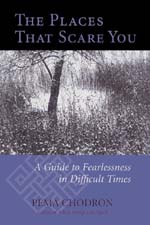Review:
The Places That Scare You:
A Guide to Fearlessness in Difficult Times
By Pema Chodron
Shambhala Publications; August 2002. Paperback.
Reviewed by Christie Keith
 Have you ever felt uncomfortable? Do you sometimes turn on the TV, or eat, or call friends on the phone, or get online, because there’s a slight anxiety or restlessness rising up in you? You might call it boredom or nervousness. You might call it fear or loneliness. Whatever you call it, it’s not comfortable. And without really thinking about it or analyzing it or even fully becoming aware of it, you do something to make it go away.
Have you ever felt uncomfortable? Do you sometimes turn on the TV, or eat, or call friends on the phone, or get online, because there’s a slight anxiety or restlessness rising up in you? You might call it boredom or nervousness. You might call it fear or loneliness. Whatever you call it, it’s not comfortable. And without really thinking about it or analyzing it or even fully becoming aware of it, you do something to make it go away.
This restless discomfort, this subliminal mental static, might come up when you’re with friends or in difficult social situations. Maybe you need to have a drink or eat something in order to keep the anxiety at bay. Maybe you feel a bit breathless or like running away when a loved one wants to talk, or places demands on you. Maybe you have learned to stiffen your spine, push your fears back, down, or aside, and stick with the tough work of communication and intimacy. Or maybe you still run.
Fear. Anxiety. Discontent. Boredom. Loneliness. Pain. Insecurity. Shyness. Wouldn’t it be nice if all those lousy feelings would just go away? Not just be beaten down and suppressed, but really eliminated forever? A hundred thousand self-help books and programs will tell you they can help you with that. Pema Chodron’s The Places that Scare You isn’t one of them.
I stumbled onto this book by accident. I’m not a Buddhist and the Buddhist teaching that “life is suffering” had always irritated me. I thought that to be a lot of nonsense, as life can be full of great joy. I didn’t want to “transcend” this world or my life; I wanted to fulfill it. Whether I misunderstood, or the writers and practitioners I listened to mis-taught, or whether the time just wasn’t right for me to hear it, I don’t know. But I was standing in a bookstore one day and saw this book, which I had been seeing in bookstores for months, and picked it up and bought it.
I expected it to be about something else entirely. I thought it would be about a psychological approach to dealing with fear by confronting the cause of our fears. Instead, Chodron, a Buddhist nun and teacher, suggested that I “drop the story line” and focus on the feeling. Stop trying to explain it or attribute it to a cause. Just feel it.
But Chodron doesn’t stop there. Not only am I supposed to feel my fears and other negative emotions, but I’m supposed to “lean into the sharp points.” I am supposed to sink into my negative emotions and fully experience them, seemingly wallow in them. This of course seems totally counter-intuitive and really, very stupid. Why would I want to do that? Why would anyone? Is this just about suffering in the name of some greater enlightenment?
I can imagine Chodron’s round, merry face creasing with laughter at that question. I don’t think she’s too interested in “greater enlightenment” or increasing suffering. It seems she thinks this method can free us from suffering and set us on a path of joy, and compassion for ourselves, and, while we’re at it, compassion for every single other human being on the planet.
There’s a huge danger, when spiritual teachings are translated for a large, general population, that they’ll be diluted or simplified to the point of pop spirituality or even reduced to the “self-help” genre. There’s a simple cure for that, which is to focus on expressing spiritual truth and not on the end result of your expression. I sense that Chodron did that, not really worrying if people might get “the wrong message” or miss her message entirely. In The Places that Scare You, she offers a number of traditional spiritual practices to develop fearlessness and compassion, and allow us not to escape or even transcend insecurity and a fear of loss and change, but to “lean into” them.
There is a lot more in The Places That Scare You than just advice for dealing with fears. Chodron introduces a number of Buddhist concepts such as samsara (the cycle of running from, or suppressing, anxiety that I described above) and tonglen (a meditation and breathing practice that develops compassion for others and heals us while we do it). Who knows if something there will be good for what ails you? Who knows if it will be the same as what helped me? Read it and find out.
